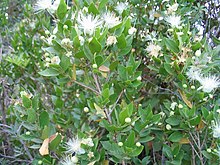Myrtus
|
Myrtus Myrtle |
|
|---|---|
 |
|
| Myrtus communis | |
 |
|
| Myrtle (M. communis) | |
| Scientific classification | |
| Kingdom: | Plantae |
| (unranked): | Angiosperms |
| (unranked): | Eudicots |
| (unranked): | Rosids |
| Order: | Myrtales |
| Family: | Myrtaceae |
| Genus: |
Myrtus L. |
| Type species | |
|
Myrtus communis L. |
|
| Species | |
|
|
| Synonyms | |
|
Myrthus Scop. |
|
Myrthus Scop.
Myrtus, with the common name myrtle, is a genus of flowering plants in the family Myrtaceae, described by Linnaeus in 1753.
Over 600 names have been proposed in the genus, but nearly all have either been moved to other genera or been regarded as synonyms. The Myrtus genus has three species recognised today:
Myrtus communis, the "common myrtle", is native across the Mediterranean region, Macaronesia, western Asia, and the Indian subcontinent. It is also cultivated.
The plant is an evergreen shrub or small tree, growing to 5 metres (16 ft) tall. The leaf is entire, 3–5 cm long, with a fragrant essential oil.
The star-like flower has five petals and sepals, and numerous stamens. Petals usually are white. The flower is pollinated by insects.
The fruit is a round berry containing several seeds, most commonly blue-black in colour. A variety with yellow-amber berries is also present. The seeds are dispersed by birds that eat the berries.
Myrtus nivellei, the Saharan myrtle, (Tuareg language: tefeltest), is endemic to the mountains of the central Sahara Desert. It is found in a restricted range in the Tassili n'Ajjer Mountains in southern Algeria, and the Tibesti Mountains in northern Chad.
...
Wikipedia
